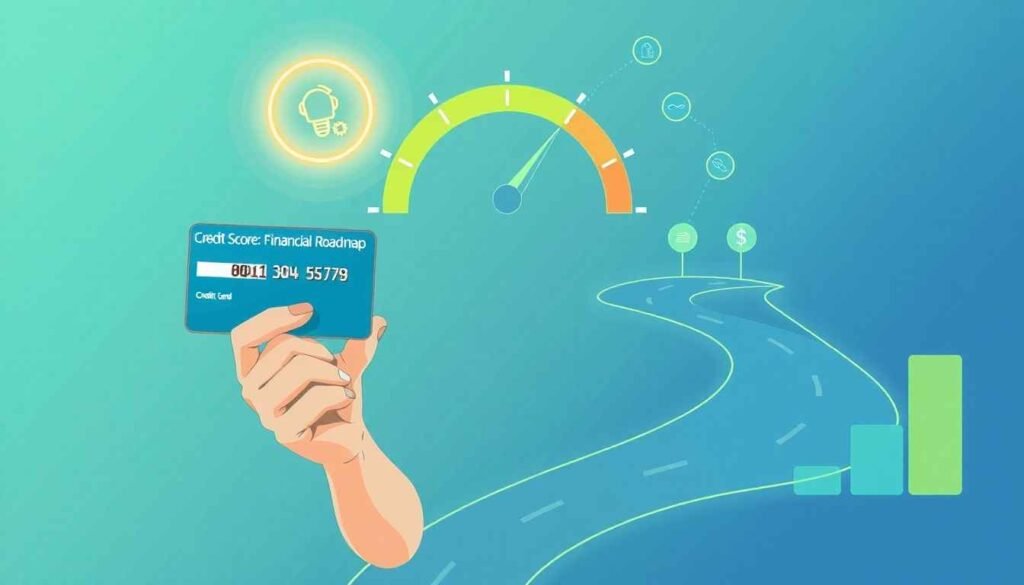
I still remember the day my friend Mark called me, practically in tears. The mortgage he’d been counting on to buy his dream home? Denied. The culprit wasn’t his income or employment history – it was his credit score. Three little digits crushed years of saving and planning.
Maybe you’ve been there too. That sinking feeling when you’re offered ridiculous interest rates. The embarrassment of card rejection at checkout. The frustration when rental applications get passed over. Behind these painful moments often lurks the same villain: a troublesome credit score.
What Is a Credit Score and Why Should You Care?
I used to think credit scores were just another boring financial metric until a 60-point difference cost me $7,200 in extra interest on my first car loan. Ouch.
Your credit score isn’t some abstract concept – it’s your financial reputation distilled into three digits that follow you everywhere. In North America, these scores typically range from 300 (financial disaster zone) to 850 (lending paradise). Europeans face similar systems, though the specifics vary by country.
Banks and lenders don’t care about your charming personality or your promises. They want hard data on whether you’ll actually repay what you borrow. Your credit score gives them that at a glance. It’s basically the financial equivalent of your reputation from past relationships – and we all know how those can haunt us!
The Real-World Impact of Your Credit Score
Look, I wish I could tell you that credit scores only matter when you’re buying a house or car. The truth? These three digits sink their claws into nearly every aspect of adult life:
Last Tuesday, my colleague Emma texted me from Boston: “I finally got approved for my mortgage, but my rate is 2% higher than what Jennifer got last month. Same lender, same property value. The only difference? Her credit score. I did the math – that’s $63,000 MORE interest over the life of my loan!”
And mortgages are just the beginning. Your credit score meddles in:
- Those rental applications (yes, landlords absolutely snoop on your score)
- Car insurance premiums (in most US states – unfair but true)
- Job prospects (especially in finance or positions handling money)
- Even your phone contract (ever wonder why some people need hefty deposits while others walk out paying nothing upfront?)
Last summer, my buddy Ryan in Manchester couldn’t even get electricity connected at his new flat without forking over a £350 security deposit. His flatmate Sam? Zero deposit. The difference came down to one thing – their credit histories.
5 Factors That Make or Break Your Credit Score
For years I struggled with my credit score, watching it bounce around like a ping-pong ball. Then I actually learned what goes into the calculation. Game-changer.
Let’s pull back the curtain on what really drives these mysterious numbers:
1. Payment History (Roughly 35% of your score)
The undisputed heavyweight champion of your credit score. Those “payment due” emails you ignore? Each one is potentially a wrecking ball to your score. Last year, I forgot about an $18 medical bill that went to collections. That tiny oversight knocked 43 points off my score overnight. Forty-three points for eighteen dollars!
2. Credit Utilization (Around 30% of your score)
This is banker-speak for “how much of your available credit are you burning through.” Maxing out your cards makes lenders sweat bullets. My neighbor Kate in Chicago learned this lesson during Christmas shopping season. Used 90% of her available credit for gifts, watched her score plummet 36 points by New Year’s – even though she paid it all off on time!
The golden rule? Keep utilization under 30%. Better yet, aim for 10-20% if you’re trying to boost your score fast.
3. Credit History Length (About 15% of your score)
Lenders are like suspicious parents – they want a long, boring track record of responsible behavior. My oldest credit card is a no-frills disaster with terrible rewards that I opened in college 12 years ago. I keep it for one reason: closing it would erase my longest credit relationship and tank my “average account age.”
4. Credit Mix (Roughly 10% of your score)
Having different types of loans shows you can juggle various financial balls without dropping any. Credit cards, auto loans, mortgages, student loans – a diverse portfolio signals responsibility. It’s why sometimes adding a new type of credit actually helps your score despite being new debt.
5. Recent Applications (About 10% of your score)
Desperately applying for every credit card offer that hits your inbox? Red flag city. Each application triggers a “hard inquiry” that can nick your score by 5-10 points. My colleague went “store card crazy” during Black Friday sales last year – applied for five retail cards in one weekend and watched his score drop by 37 points!
Ready for a Career Change That Could Help Your Finances?
You know what messes with credit scores almost as much as late payments? Income instability.
Three months ago, I was grabbing coffee with my friend Alicia. She’d been working retail for years – solid job, but the hours were all over the place, and her income fluctuated wildly depending on the season. Every December was great; every February was financial panic. Her credit score had been stuck around 640 for years despite her best efforts.
Over cappuccinos, she mentioned she’d started doing online customer service work on the side. Remote work, flexible hours, steady paycheck. Two months later, she’d quit retail completely. “The consistent income changed everything,” she told me last week. “I’ve made every payment on time for three months straight. Already up 22 points.”
That conversation got me curious, so I looked into it. Turns out Live Chat Jobs has been connecting people with legitimate online customer service positions. The appeal is obvious – work from your couch, choose hours that fit your life, and earn reliable income that helps you tackle those credit-crushing debts.
I’ve seen what feast-or-famine income does to good people’s credit scores. If you’re stuck in that cycle, maybe it’s worth checking out. These aren’t get-rich-quick schemes – they’re legitimate customer service roles you can do remotely, often with better stability than traditional retail or service jobs.
Click here to explore online job opportunities that might finally give you the income stability your credit score needs.
Practical Steps to Boost Your Credit Score

Enough theory – let’s talk tactics. After spending way too many hours researching credit repair (and making plenty of mistakes along the way), here’s what actually works:
Hunt Down Errors Like Your Financial Life Depends On It
Last month, my brother-in-law Thomas called me from his flat in Manchester. He’d been obsessing over why his score was stuck in the low 600s despite doing everything “right.” Finally ordered his full reports and discovered someone else’s £12,000 personal loan attached to his profile, plus an address he’d never lived at. One dispute letter later, his score jumped 85 points.
In America, you can get free reports at AnnualCreditReport.com. My UK friends swear by ClearScore and MSE’s Credit Club. Block out a Sunday afternoon, pour something strong, and comb through every line. Boring? Yes. Worth it? Absolutely.
Automate Your Life (Because Your Memory Will Fail You)
Three years ago, I missed a $58 credit card payment because I was traveling. That 12-day oversight haunted my credit score for 24 months. Now everything – and I mean everything – is on autopay, at least for minimum payments. Set it and forget it.
Attack Debt Strategically (Not Emotionally)
After my divorce, I had seven different debts and limited cash. My instinct was to spread payments evenly – totally wrong approach. My financial advisor Sarah suggested two options:
The “Debt Snowball” – tackle smallest balances first for psychological wins (think Dave Ramsey style) The “Debt Avalanche” – attack highest interest rates first for mathematical wins
I went snowball and paid everything off 7 months faster than my original plan. The psychological momentum was real.
Make Mid-Cycle Payments (This Hack Works)
Credit card companies typically report balances once a month. Even if you pay in full monthly (which you should!), they might report when your balance is highest. My workaround? I make two smaller payments each month instead of one big one. My reported utilization dropped from 28% to 11% without spending less.
Old Credit Cards Are Like Fine Wine
That embarrassing starter credit card with the childish design and pathetic 0.5% cashback? KEEP IT. I nearly closed my oldest card last year until a banker friend grabbed my phone mid-call. “That card is gold for your credit age,” she hissed. Now I buy lunch with it once every few months just to keep it active.
Leverage Credit-Building Tools
My cousin Sarah moved from Dublin to Chicago with zero US credit history. Starting from scratch at 32 was brutal. She got a secured card (where you deposit $500 to get a $500 limit), made small weekly purchases, and paid them off immediately. Within 13 months, her score went from nonexistent to 715. The bank returned her deposit and upgraded her to a regular card with triple the limit.
Credit Score Myths That Need to Die
The amount of credit score nonsense floating around online makes me want to throw my laptop out the window. Let’s murder some myths:
“Checking your credit score hurts your credit.”
My dad avoided checking his score for SEVEN YEARS because of this garbage advice. Checking your own score is what’s called a “soft pull” and has absolutely zero impact. It’s only when lenders check your credit (a “hard pull”) that your score takes a small, temporary hit. Monitor away – I check mine weekly.
“You should carry a small balance on your cards to boost your score.”
This expensive myth cost my roommate $340 in completely unnecessary interest last year. Carrying a balance doesn’t help your score one bit. The credit bureaus don’t care if you pay $0 or $0.01 in interest – they care that you use credit and make payments on time. Pay in full, save the interest.
“Having zero debt gives you a perfect credit score.”
My aunt proudly declared herself “debt-free” after paying off her mortgage. Two years later, she applied for a car loan and was shocked at her mediocre rate. Why? Her credit score had actually dropped because she wasn’t actively using any credit. The system doesn’t reward debt-free living – it rewards responsible credit management.
“Closing old credit cards helps your score.”
My colleague Brad closed three old credit cards after getting married, thinking he was “cleaning up his finances.” His score dropped 46 points virtually overnight. Why? He accidentally nuked his available credit and shortened his credit history in one move. Those dusty old cards were actually credit score gold mines.
The Real Timeline of Credit Improvement (Not What You Want to Hear)
I hate those “boost your credit 100 points in 30 days!” articles. They’re hot garbage. Here’s the unvarnished truth about credit repair timelines, based on what I’ve seen with friends, family, and my own score:
The First 30 Days: Honestly? Not much visible improvement unless you’re correcting major errors. This is the “am I doing this right?” phase where motivation wavers because you don’t see results.
1-3 Months: If you fixed legitimate errors, you might see 20-45 point improvements here. Otherwise, you’re still in the credit score desert, questioning your life choices.
4-6 Months: This is where consistent payments and utilization management start creating small but noticeable improvements. My best friend saw a 38-point increase around month 5, which finally got her out of “poor” and into “fair” territory.
8-12 Months: The compounding effect begins. Those on-time payments have actual weight now. Low utilization becomes a pattern the algorithms reward rather than a fluke they ignore.
12-24 Months: This is the sweet spot where seriously damaged credit can transform. My buddy James in Chicago went through a brutal divorce that trashed his finances. “I started at 580 after everything settled,” he told me over beers last month. “Spent 18 months religiously managing a secured card, never missing payments on anything, and watching my utilization like a hawk. Hit 720 last week and just got pre-approved for a mortgage I never thought I’d qualify for.”
The cold, hard reality? Meaningful credit improvement takes months, not days, and substantial rebuilding takes 1-2 years. Anyone selling you a faster solution is selling snake oil.
Beyond the Score: The Rest of Your Financial Life

I spent three years obsessing over my credit score, getting it from the 610s to the high 700s. Know what I realized once I hit that target? A good credit score doesn’t equal financial health – it’s just one indicator.
My neighbor Lisa has an 800+ credit score but zero retirement savings at 42. My coworker has a mediocre 680 score but already has enough passive income to cover half his monthly expenses. Which situation would you rather be in at 65?
Real financial health looks like:
• Having “oh crap” money – ideally 3-6 months of expenses stashed somewhere boring and accessible
• Contributing enough to retirement that future-you won’t hate present-you (seriously, that compound interest math is no joke)
• Building income streams you don’t have to trade time for
• Actually understanding where your money goes each month (most people genuinely don’t)
Credit scores matter – I wouldn’t have written 2,500+ words if they didn’t. But they’re a means to an end, not the end itself. The goal isn’t a perfect score; it’s the freedom and options that good credit helps create.
What To Do Tomorrow Morning
If this article got you fired up to take action (I hope it did), here’s what to do:
- Block off 30 minutes tomorrow to pull your free credit reports. Seriously, put it on your calendar right now – AnnualCreditReport.com for Americans, ClearScore for my UK friends.
- Set up autopay for at least the minimum on EVERY bill you have. Yes, all of them. Do it now, not later.
- If inconsistent income is part of what’s holding your credit score hostage, take five minutes to check out these flexible online job opportunities. The customer service positions can work around your existing schedule and provide that stability your credit score craves.
My friend Denise waited 12 years to get serious about her credit – “I just figured I was stuck with bad credit forever,” she told me. Those 12 years cost her roughly $32,000 in higher interest rates and lost opportunities.
Don’t wait. Your credit score might be just a number, but the impact it has on your life is anything but.



